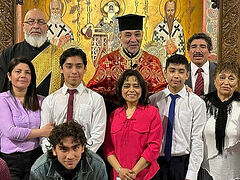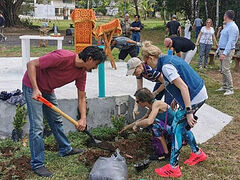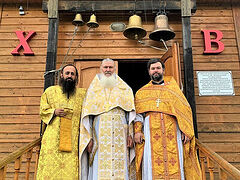Priest Alexander Paramonov, a guest of Sretensky monastery, resides and serves in an Australian town called Gold Coast. He answered our questions regarding his life and, together with his wife, matushka Leah, he told us what life is like for Christians in that remote corner of the world.
 Priest Alexander Paramonov —Father Alexander, tell us about yourself, please. How did you become an Orthodox priest?
Priest Alexander Paramonov —Father Alexander, tell us about yourself, please. How did you become an Orthodox priest?
—I was born in Australia, and thank God, I grew up in an Orthodox family in the town of Geelong not far from Melbourne. We had one Orthodox church there. Its rector took me in as an altar server when I turned six. I later tried to learn more about our faith and the divine services. I also sang in the choir and served as a reader. Over time, I came to the realization that I needed to enter the Holy Trinity Seminary in Jordanville, USA and I graduated there in 2003. Then I returned to Australia and served as a choir director in a parish located in northern Australia, in our balmy state of Queensland.
Then, a local bishop ordained me a priest to serve at a parish church in the resort town of Gold Coast. With its oceanfront stretching as far as forty kilometers, the town is a well-known vacation spot. The weather here is warm year-round. I served for half a year in the cathedral in Brisbane assisting Protopresbyter Gabriel Makarov. Their parish of Sts. Cyril and Methodius has been famous for its missionary work over the last forty years. When we arrived to Gold Coast, we at first held services every Saturday on the premises of the Serbian Orthodox Church. Later on, a benefactor was able to organize a temporary location for our church and so we began weekly services on both Saturdays and Sundays. This is where we are still located today.
—Outside of your duties as a priest, do you have a secular job?
—Yes, I am an IT specialist. I currently work Monday through Friday at a local emergency department and minister as a priest on weekends.
—Who are your parishioners and how many do you have?
—We have about fifty members who are regulars at our services. They represent quite a diverse mix, because Australia is a multinational country. There are, of course, old émigrés from Russia, but they are few and far between. There are also those who arrived only ten or so years ago from Russia. We also have native Australians who converted to Orthodoxy, Africans, Ukrainians, Romanians, Americans, and so on. But for the most part, our parish is made up of Russian speakers. We also have several catechumens who are getting ready to be baptized. We have new converts and they make an effort to become regular churchgoers.
—Australia is a wealthy country. Does this influence people’s spiritual life in any way? Do the faithful have the desire to come to Communion and pray more often?
—Yes, Australians live quite comfortably, they are also very active in sports and surfing. Our parish has easy access to a great number of beaches. Speaking of our parishioners, they do come to Communion often. We try to encourage everyone who comes to us to lead an active spiritual life. That’s why the majority of adults from our parish commune often. Sure, anyone can be slothful in prayer, when all you want to do is have non-stop fun, or to read something distracting, or to watch something online. We all go through these moments all the time. Under such circumstances, it’s definitely hard to concentrate not only on prayer, but more on genuine prayer, when you feel that the Lord hears your prayers and the Most Holy Mother of God and our God-pleasing saints offer your prayers up to God. There is less interest in praying when you live comfortably than when you encounter problems, have temptations or suffer. The Lord sends them our way, but differently: through illnesses or through other people. I think that the majority of Australians don’t even have a passing thought about God. And it’s quite a challenge to hold conversations about faith with them.
 With Matushka Leah —How many Christians are there in Australia in general?
With Matushka Leah —How many Christians are there in Australia in general?
—Well, there are very many here who consider themselves Christians. It’s more likely you will be able to explain to locals that we are Orthodox if we say we are like Greeks, except that we are Russians. Because practically everyone in Australia heard about the Greek Orthodox Church. The Christians from various Local Churches do communicate with one another. We recently celebrated the one-hundred-year anniversary of the St. Nicholas Cathedral in Brisbane. Many people came there from other churches. On a personal level, we have close relationships with both the Greeks and the Ukrainians. Sure, the Greek priests do not concelebrate with the Russians. But Serbs do invite us to concelebrate on their liturgical feasts.
—What challenges does your parish face?
We currently have a temporary church that is set to be demolished. We are in the process of purchasing a plot of land, and God willing, we will build our own church. Most likely, it will be in honor of St. Xenia of St. Petersburg. There are some pressing issues with the local authorities and we try to handle them with patience. We have almost all the money needed to buy that land, with just a little bit left to collect. Of course, our parishioners face challenges, as some are sick or have issues in their family life. Well, just like anywhere else.
We try to encourage everyone who comes to us to lead an active spiritual life
Matushka Leah:
—There is this problem here when the state provides no support to the Church whatsoever. In Russia, the state sides with the Church, while Australian economy and society have a plain-out marketing operating model. And so, the Church is not supported by the state in any way. No subsidies, nothing. The state may choose to support certain projects on the condition that they are not under the auspices of a religious organization, but rather a social or a cultural one. This is a huge stumbling block. We don't feel the support of the state at all. We can't build a church in any neighborhood of our choice, but only in the so-called semi-industrial zones. Our zone is different, but we were able to get permission to build a church. We can't simply buy a plot of land and build a church there.
 —What saints do your parishioners love most?
—What saints do your parishioners love most?
—Of course, Holy Blessed Xenia of St. Petersburg, since our parish is dedicated to her. We have a wonderful new icon of St. Paisios the Athonite painted for our parish. There is also St. Nicholas the Wonderworker and St. Seraphim of Sarov. We venerate the Serbian saints, such as Saint Basil of Ostrog. Our parishioners often travel to holy places in Serbia and bring icons for the church.
— How difficult is it to bring up children in Christian tradition in your country? After all, it supports those who adhere to the so-called non-traditional values.
— Of course, we, as priests and as a parish, can do little and we have limited effect on our children. Maybe some Sunday schools hold additional conversations with children. But it is very important that children receive proper Christian education in their families. They need to hear explanations regarding our views about these unions, that we don’t accept them and try to avoid them like any other sin. It is important to explain Orthodox values to children in the family. Priests won’t always say everything from the pulpit. Especially since children are constantly moving around at church, with some going outside and others crying. People have limited attention while the priest is preaching. So, it is important to talk to children in the family.
— We don’t yet feel like our lives have been greatly influenced by all this because we live in the state of Queensland, and it differs from, say, the state of Victoria in South Australia. The schools there are fully immersed in the process called “safe school” when a boy can think he's a girl. They’ve gone too far there. Our state is somewhat backward, and that’s an advantage for us.
But we already feel like our children are being inculcated with an idea that non-traditional values are the norm. We see how it happens with the kids studying at grades higher than our own children. It’s not as obvious at the elementary school level. But in high school, there are already after-school programs for children who identify themselves as “non-traditional.” Even our children, who are being brought up in an Orthodox family, already begin to ask such questions as, “Why does our family consider it wrong?” In other words, society emphasizes not simply the idea of accepting such people but it offers something much more cunning—its goal is for no one to ever question it whether it is abnormal or not. So they subtly promulgate it.
It is truly important that children receive proper Christian education in their families
Sure, it is hard, because you have to be on guard. But it is the family’s job to decide how much time the family will spend on conversations about all these issues with the child. Besides, it is necessary to handle the matter subtly in order to avoid generating aggression in children against those who live with this delusion and sin. Our goal is to develop a negative attitude to sin, not to people. We don’t want to raise aggressively minded people. Yet, at the same time, we don’t want them to forget the dogmas of the Church, why we treat it this way, so that they would be able to explain it to other people. Work needs to be done in this respect, we have to stay focused and we can’t have schools be in charge here, because that’s where our children will be led astray. Speaking of Russia, for example, you can allow yourself to be lax in this matter.
—But Australia doesn’t oppress Christians, does it? Can you walk down the street wearing a cross?
—I can walk down the street wearing the cross. No problem. Even after the Liturgy I often go to different places wearing a pectoral cross. A total stranger can even call out, “Hi, Father! I’m a Christian too!”
Matushka Leah:
But it's not because Australia is so Christian a country; it’s because you can do anything you want in Australia. You can walk around wearing anything you want.
—Your parish belongs to the Russian Church. Do you feel like outcasts in some way these days, in light of the current situation?
—It could have been really bad, but thanks be to God, that never materialized. We and the Ukrainians try to support each other.
Matushka Leah:
—Our small parish has expanded greatly over the last year and a half precisely because of the influx of refugees from Ukraine. It has probably increased in size by twenty percent or so. We try to find salvation as a community and to support one another. We help in any way we can, but we don't discuss politics.
—Are there Orthodox believers among the Australian Aborigines? Does anyone evangelize them at the moment?
—Yes, there are believers among them. Generally speaking, they have an ancient legend called “Dream Time.” and it has many stories similar to those in the Book of Genesis of the Old Testament. There was an Aboriginal Orthodox in their community named Seraphim. He was ordained a priest in Melbourne just when the choir from the Sretensky monastery came on tour there. He even had a special set of vestments made and decorated with Aboriginal embroidery. He had his own radio program for ten years. Unfortunately, he has already passed away. So, we don't know what life is now like in that community where he lived. Theirs are isolated tribes and they practically live according to the “Domostroy.” 1
When missionaries came to Australia two hundred years ago, they adopted an American approach to missionary work. It was a bad match with Aborigines. They forced them to become Christians, to learn a new culture and faith, and their children were separated from them. The ripple effect from such missionary activities was felt up until the 1970s. In Fr. Seraphim’s opinion, had they been treated the way the Russians treated the Aleuts in their time, perhaps every Australian Aborigine would be Orthodox by now....
I can walk safely with the cross. Even after Liturgy, I often travel to different places wearing a pectoral cross
—Do they visit your parish?
—They live in the deserts and almost none of them resides in urban areas. So, they don’t visit us. But ordinary Australians are interested in Orthodoxy. In Brisbane, for example, there is a strictly English-language parish with an active Australian priest.
Matushka Leah:
—This is the fastest growing parish of the Russian Orthodox Church Abroad, because it attracts so many Australians and catechizes them. They also have many young people who are interested in Orthodoxy.
—What monasteries are there in your diocese?
—Our diocese has three monasteries, including two women's monasteries. In the desert near Bombala, there is the Holy-Transfiguration monastery. It has only a few monks, maybe as little as five. There is a women's monastery called New Shamordino located south of Sydney. It has only a few nuns and they aren’t young anymore. But there are no monasteries in our part of the state of Queensland.
 Metropolitan Laurus (Shkurla) —Can you think of any examples of spiritually gifted people you encountered in your life? What memories do you have of them?
Metropolitan Laurus (Shkurla) —Can you think of any examples of spiritually gifted people you encountered in your life? What memories do you have of them?
—Metropolitan Laurus (Shkurla), the abbot of Jordanville Monastery and rector of our seminary, remains alive in my memory. He served at our church almost every Sunday when he wasn’t away on business. I loved attending the hierarchical services and holding the book for him, or seeing him immersed in prayer for all of us. I also remember the elderly monks there. I spent five years near them and observed their efforts, feats, restraint—and their silence. This made an impression on me. My grandmother also had a great influence on me, when I visited her in childhood and heard her praying while she walked around the house. It was if she was talking to the Lord. Or, there was my aunt, who sewed two hundred sets of vestments for priests all over Australia, how she prayed earnestly and very diligently. All this, of course, influenced me.
—What can you say about modern Russia? How much has the country changed since your last visit?
—My last visit to Russia was seven years ago. I think there are positive changes. There is much less advertising everywhere. It was quite shocking to see it at the time. It’s clear to me that Russia is trying to pursue a domestic policy that supports family, as well as large families, and traditional Christian values. I think this is a very good thing and the West really can’t stand it.
—In conclusion, what would you like to say to Russian believers?
—As strange as it may sound, I think it is very important that your people keep trying to take matters of faith seriously. It is important that they don’t just celebrate and feel the greatness of their country, but also have repentance, humility, contrition of heart, and know that the Lord is close to them....





